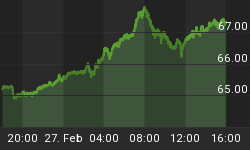I frequently check CME Fedwatch for a look at market expectations of rate hikes.
When expectations rise, I typically laugh.
Given all the analysis on stunning job growth, inventory builds, Fed pontifications, and other drivel, interest rates ought to be at least 1% by now.
But here we are. Rate hike expectations are sinking fast ... again.
This evening, just for grins, I decided to check what market participants thought of rates hikes.
September 2016

The much touted "September rate hike on the table" message is now dead on arrival.
OK, but when?
May 2017

The market now believes the next rate hike will be in June of 2017, pushed back from May yesterday and March following the last jobs report.
Why?
That's easy, but Fed presidents, mainstream media, and economists in general still haven't figured it out.
Here's the answer in a nutshell: Every good economic report is invariably followed up with an equally bad if not worse economic report.
Excuses have been endless: China, Brexit, Jobs, GDP have all come into play.
Given two allegedly excellent jobs reports back-to-back, the September hike thesis was "surely" in play.
That notion lasted from the jobs report on August 5 until the August 9 BLS admission Productivity Declines 0.5%, Down 3rd Consecutive Quarter, Longest Losing Streak Since 1979.
Real Wages Decline
Buried deep in that productivity admission was this little tidbit from the BLS.
"Due to a 4.7-percentage point downward revision to first-quarter hourly compensation, unit labor costs decreased 0.2 percent in the first quarter of 2016, rather than increasing 4.5 percent as reported June 7. Real hourly compensation decreased 0.4 percent after revision, rather than the previously-published increase of 4.2 percent."
Fancy that. Despite huge minimum wage hikes, wage earners are still losing ground.
One day ahead of the productivity report, the Wall Street Journal posted an article entitled "Voter Discord Isn't Over Wages".
I commented on that notion ahead of the productivity report in Is Voter Discord Over Jobs and Wages? If Not, What?
My conclusion was "People may cite race relations, police attacks, security, etc., but those concerns have their roots in something else: a feeling of slipping economically behind over a decade or longer, as the rich get richer and richer."
One day later I offered this recap: Pocketbook Theory – Mish vs. Wall Street Journal.
Please take a look.
Rate Hike in September?
For the Fed to hike in September, the data between now and then better be uniformly positive. Even then, it's not a slam dunk given that horrendous productivity report.
To put it mildly, don't count on it.















